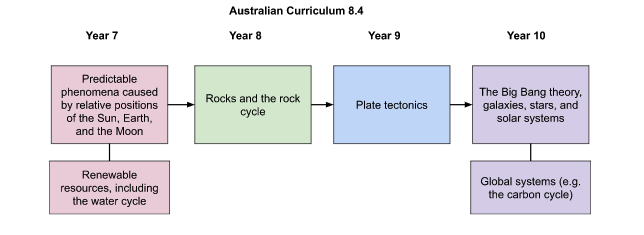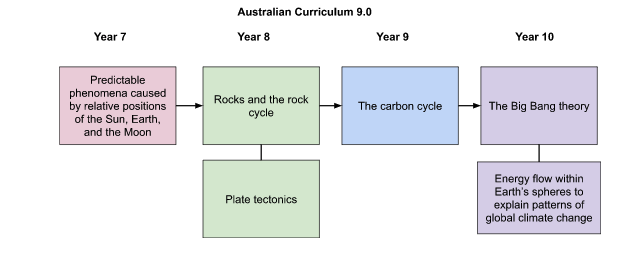
By Jacqui Bennett
The new Australian Curriculum 9.0 has some major changes in what is taught at each level for junior secondary Science. Sometimes whole descriptors have been moved to another year level, which means teachers will have to change learning sequences that may have been in place for years.
Let’s look at Earth and space sciences as an example.
This was the sequence of topics across Years 7-10 previously:

This is the sequence for Australian Curriculum 9.0:

Year 7 has lost the renewable resources descriptor, which no longer appears in the junior curriculum under ‘Science Understanding’. However, the concept of renewable resources is sprinkled across the ‘Science as a Human Endeavour’ elaborations throughout Years 7-10, so teachers can still cover this concept.
Plate tectonics has been moved to Year 8, which makes sense since the rock cycle and plate tectonics have overlapping ideas.
Year 9 and 10 weigh heavily towards carbon and climate change, which is bringing the curriculum more in line with current world events. This is quite a large change, but some of the previous Year 10 content could potentially be repurposed for Year 9. The opportunity to cover these topics in depth could be exciting for some teachers, but might also present challenges due to its newness.
As a teacher you might find yourself asking: where is the water cycle? Rather than being taught in the context of changes of state of water and factors that influence the cycle, there is now scope to teach it in the context of global climate systems. I, for one, am happy with this change as taking a global climate systems view means it’s no longer about ‘what is the water cycle?’ (which Humanities can now cover) and more about ‘how do systems interact to affect global climate?’
Overall, 9.0 has made some significant changes to Earth and space sciences across Years 7-10, with the major changes being Years 9 and 10. Hopefully, this is not too earth-shattering for schools and over time this will allow for some groundbreaking lessons.
Jacqui Bennett is a Science Content Associate at Edrolo.


